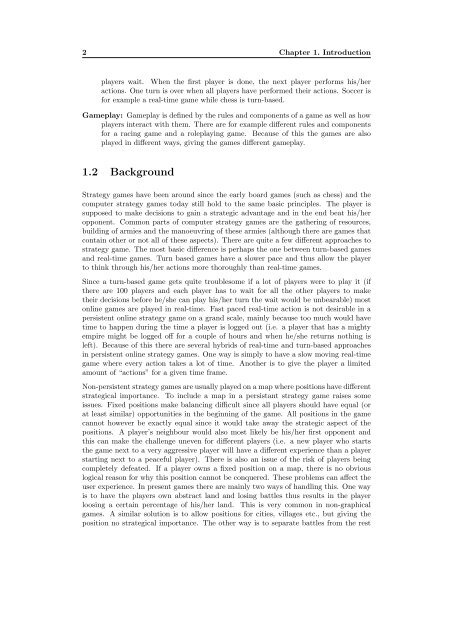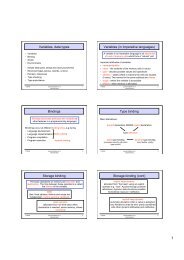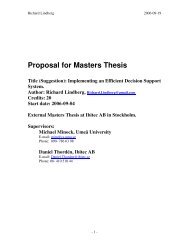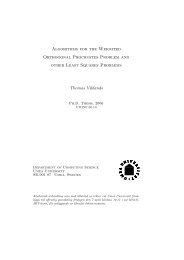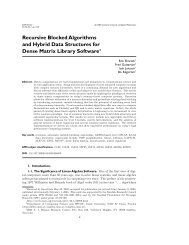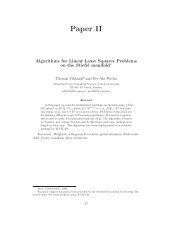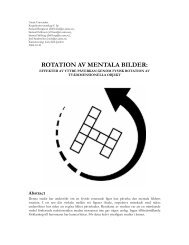Designing a persistent online strategy game - Department of ...
Designing a persistent online strategy game - Department of ...
Designing a persistent online strategy game - Department of ...
Create successful ePaper yourself
Turn your PDF publications into a flip-book with our unique Google optimized e-Paper software.
2 Chapter 1. Introduction<br />
players wait. When the first player is done, the next player performs his/her<br />
actions. One turn is over when all players have performed their actions. Soccer is<br />
for example a real-time <strong>game</strong> while chess is turn-based.<br />
Gameplay: Gameplay is defined by the rules and components <strong>of</strong> a <strong>game</strong> as well as how<br />
players interact with them. There are for example different rules and components<br />
for a racing <strong>game</strong> and a roleplaying <strong>game</strong>. Because <strong>of</strong> this the <strong>game</strong>s are also<br />
played in different ways, giving the <strong>game</strong>s different <strong>game</strong>play.<br />
1.2 Background<br />
Strategy <strong>game</strong>s have been around since the early board <strong>game</strong>s (such as chess) and the<br />
computer <strong>strategy</strong> <strong>game</strong>s today still hold to the same basic principles. The player is<br />
supposed to make decisions to gain a strategic advantage and in the end beat his/her<br />
opponent. Common parts <strong>of</strong> computer <strong>strategy</strong> <strong>game</strong>s are the gathering <strong>of</strong> resources,<br />
building <strong>of</strong> armies and the manoeuvring <strong>of</strong> these armies (although there are <strong>game</strong>s that<br />
contain other or not all <strong>of</strong> these aspects). There are quite a few different approaches to<br />
<strong>strategy</strong> <strong>game</strong>. The most basic difference is perhaps the one between turn-based <strong>game</strong>s<br />
and real-time <strong>game</strong>s. Turn based <strong>game</strong>s have a slower pace and thus allow the player<br />
to think through his/her actions more thoroughly than real-time <strong>game</strong>s.<br />
Since a turn-based <strong>game</strong> gets quite troublesome if a lot <strong>of</strong> players were to play it (if<br />
there are 100 players and each player has to wait for all the other players to make<br />
their decisions before he/she can play his/her turn the wait would be unbearable) most<br />
<strong>online</strong> <strong>game</strong>s are played in real-time. Fast paced real-time action is not desirable in a<br />
<strong>persistent</strong> <strong>online</strong> <strong>strategy</strong> <strong>game</strong> on a grand scale, mainly because too much would have<br />
time to happen during the time a player is logged out (i.e. a player that has a mighty<br />
empire might be logged <strong>of</strong>f for a couple <strong>of</strong> hours and when he/she returns nothing is<br />
left). Because <strong>of</strong> this there are several hybrids <strong>of</strong> real-time and turn-based approaches<br />
in <strong>persistent</strong> <strong>online</strong> <strong>strategy</strong> <strong>game</strong>s. One way is simply to have a slow moving real-time<br />
<strong>game</strong> where every action takes a lot <strong>of</strong> time. Another is to give the player a limited<br />
amount <strong>of</strong> “actions” for a given time frame.<br />
Non-<strong>persistent</strong> <strong>strategy</strong> <strong>game</strong>s are usually played on a map where positions have different<br />
strategical importance. To include a map in a persistant <strong>strategy</strong> <strong>game</strong> raises some<br />
issues. Fixed positions make balancing difficult since all players should have equal (or<br />
at least similar) opportunities in the beginning <strong>of</strong> the <strong>game</strong>. All positions in the <strong>game</strong><br />
cannot however be exactly equal since it would take away the strategic aspect <strong>of</strong> the<br />
positions. A player’s neighbour would also most likely be his/her first opponent and<br />
this can make the challenge uneven for different players (i.e. a new player who starts<br />
the <strong>game</strong> next to a very aggressive player will have a different experience than a player<br />
starting next to a peaceful player). There is also an issue <strong>of</strong> the risk <strong>of</strong> players being<br />
completely defeated. If a player owns a fixed position on a map, there is no obvious<br />
logical reason for why this position cannot be conquered. These problems can affect the<br />
user experience. In present <strong>game</strong>s there are mainly two ways <strong>of</strong> handling this. One way<br />
is to have the players own abstract land and losing battles thus results in the player<br />
loosing a certain percentage <strong>of</strong> his/her land. This is very common in non-graphical<br />
<strong>game</strong>s. A similar solution is to allow positions for cities, villages etc., but giving the<br />
position no strategical importance. The other way is to separate battles from the rest


